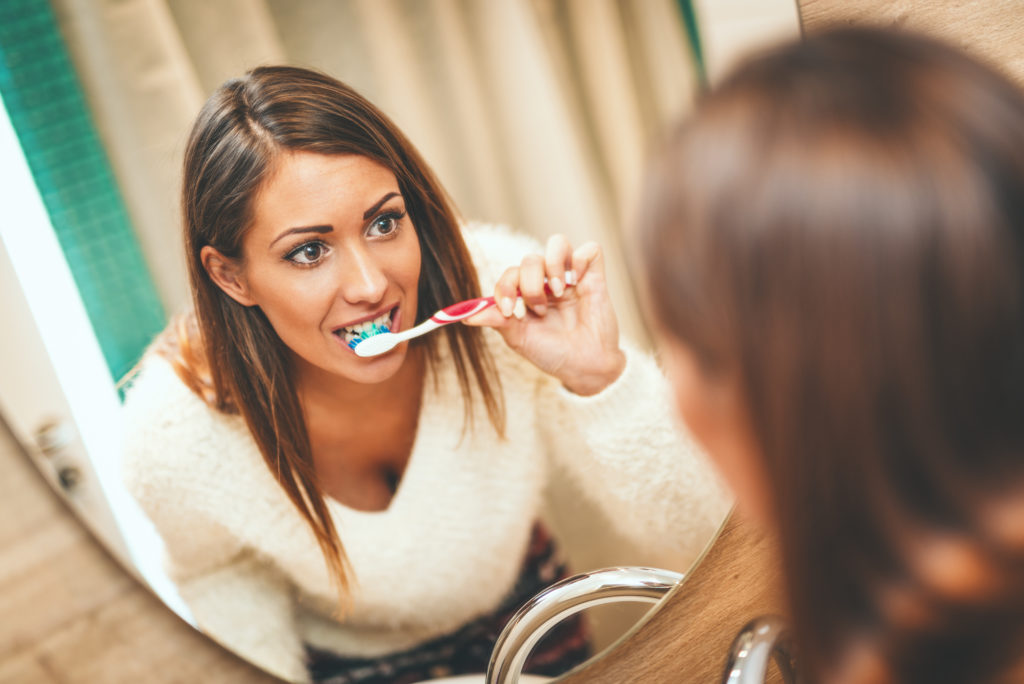Maintaining good oral hygiene is vital to overall health. health. The mouth is in constant contact with countless bacteria on a daily basis. Discover our tips on how to clean your teeth properly and avoid the appearance of cavities, bad breath, gingivitis and other pathologies.
#1 Buying the right toothbrush
The first step is to buy a toothbrush that's right for you. adapted to your needs. Some are designed for adults, others for children. Generally speaking, we recommend using a small, soft-bristled toothbrush. This way, you'll be able to to clean all the nooks and crannies of your mouth, as well as the interdental spaces. Remember to change your toothbrush every three months for optimum efficiency. This is a strictly personal accessory.
#2 Prefer fluoridated toothpaste
A good oral hygienetary also requires the use of a fluoride-enriched toothpaste (between 1000 and 1500 ppm), except for children and adults with contraindications. This trace element strengthens the crystalline structure of enamel and helps prevent the onset of plaque or cavities. Manufacturers offer a range of toothpastes for every need: whitening, anti-tartar, for sensitive teeth or fragile gums, for example.
#3 Performing the correct brushing movements
We advise you to brush your teeth in front of a mirror to help you master your brushing technique. Follow the same order to make sure you don't forget any part of your mouth. your mouth. Brush the upper and lower jaws separately. Brush in circular, rolling movements from gum to tooth. Brush at a 45-degree angle. Avoid vigorous scrubbing, as you risk irritating your gums. Electric toothbrushes are a good alternative to manual toothbrushes for achieving the ideal rotation.
#4 Respect brushing time
To allow the active ingredients in the toothpaste to work, you need to brush your teeth for 2 to 3 minutes. To make this time time seem shorter, don't hesitate to listen to music. The ideal brushing time is that of a song.
#5 Brush teeth 2 times a day
In theory, it's advisable to brush your teeth after every meal to remove plaque. Over time, this plaque develops into tartar, which requires scaling by a dentist. In practice, however, it's very difficult to brush 3 times a day. The World Health Organization recommends brushing your teeth in the morning after breakfast and in the evening after dinner. Be careful, as certain acidic foods can weaken enamel. It's best to wait 30 minutes after eating before brushing.
#6 Using dental floss
Flossing is an effective way of removing food residues between teeth. This is because the bristles of a toothbrush are generally unable to reach these interstices. Simply cut 30 to 40 centimetres of dental floss and pass it gently between each of your teeth to avoid injuring the gums. You can do this at least once a day. day. Dental floss holders are also available for easy handling.
#7 Use oral hygiene accessories
There are other oral hygiene accessories to complement tooth brushing. These include interdental sticks or brushes, which are particularly useful in cases of of prostheses (see our dedicated page) or loosened teeth. This allows you to clean small spaces that are inaccessible with a brush. There are also water jets or pulsators that remove food waste by means of pressure. Mouthwash (preferably alcohol-free) can be used to rinse the mouth after brushing. Finally, you can use a plaque developer to assess the presence of plaque. All these products help you to thoroughly clean your oral cavity.
#8 Chewing gum
Don't have time to brush your teeth after lunch? ? The emergency solution is to chew sugar-free gum. This will increase saliva production, which corrects mouth acidity and protects from bacterial attack. The other alternative is to bite into an apple. This fruit cleans the surface of the teeth without getting stuck in the interstices.
#9 Avoid snacking
To preserve the health of your oral cavity, we strongly recommend that you refrain from snacking between meals. This bad habit creates an acidic environment in the mouth. The result: bacteria multiply, making it easier for cavities to form.
#10 Regular dental check-ups
To prevent cavities and dental pathologies, it is essential to to consult a dentist. This specialist examines your oral cavity, performs and diagnoses problems in good time. Adults should adults, and twice a year for children. It's the last gesture to adopt for the beauty of your smile and the health of your mouth.
HELVIDENT welcomes you to its dental centers in the French-speaking part of Switzerland, in Lausanne, Aigle and Fribourg. Our team of dentists realizes all routine and specialized dentistry.

